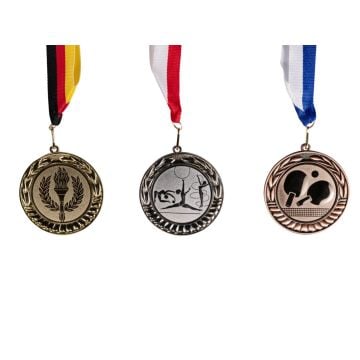
Medals
High quality medals for tournaments and more
Sport is often more than just a leisure activity. The competition also counts for many athletes. Landing on the podium at the end of a tournament is the goal in every discipline. Clubs, sports associations and schools are ready for every award ceremony with the medals from the range of sports awards.
Buy medals: equipment for associations, clubs and schools
In the shop, organizers of tournaments will find high-quality medals to present at the award ceremonies. These are sets consisting of gold, silver and bronze medals. Organizers can choose between different emblems with sports motifs. Alternatively, the badge can also be refined with foil or direct engraving. The required medal ribbon for hanging is also part of the scope of delivery.
Sports prizes have a high emotional value, especially at a young age. Sports tournaments in a club or association as well as sports events at school are the ideal opportunity to present sports medals. Buying medals is therefore worthwhile for everyone who works with children and young people in sports. From club-internal tournaments to national championships, they offer organizers a simple and inexpensive way to reward the performance of participants. Buying the medals in good time is therefore a permanent requirement of the club.
Clubs, associations and schools that order medals receive durable and hard-wearing badges that are ideal for a variety of sports and competitions. In football, handball, running and tennis, medals have proven themselves as sports prizes.
What are medals used for?
Medals are particularly common in sports. This honors outstanding achievements, so that they are primarily awarded to the winners. But medals for second and third place are also known. Instead of a gold coating, these appear in silver or bronze. There is hardly a competition that ends with an award ceremony that does not use medals.
The most prominent competition in which medals play a major role is the Olympic Games. Similarly, championships in athletics, swimming, handball and many other disciplines have also adopted them as badges. They are also used in children's and youth tournaments. The youngest athletes in particular are happy about the appreciation of their achievements at all sporting events. Schools and sports clubs can thus prepare themselves for upcoming competitions by ordering medals for school and club needs.
How did medals come about?
At least since the first modern Olympic Games in 1896, medals and sport have been inextricably linked. Although there was no gold medal at that time, since silver and bronze went to the winner and runner-up, the badges were used to honor the best in the competition.
The first medal, on the other hand, was probably made around 1400 in the Netherlands. They were dedicated to famous people at the time and were considered works of art. Finally, Louis XIV established a monopoly in medal minting in France.
With the Games in Athens in 1896, medals were increasingly made for outstanding athletes. From then on, the triumphal procession of the badges could no longer be stopped. Some athletes, such as swimmer Michael Phelps, were so successful that they collected several gold medals at the Olympic Games. In four participations he achieved an unbelievable 23 golden badges.
What material are medals made of?
The first true Olympic gold medal was awarded at the 1908 Games in London. In 1912 in Stockholm that was already the end of it. Since then, the badges have had a gold coating, but the core consists of silver or bronze mixtures that can be engraved. The reason for this was the high price of gold. Many competitions now even use recycled material.
The material used to make badges depends on the importance of the competition. The big world championships are still at least partly silver or bronze. Cheaper models, on the other hand, are mostly made of a zamak alloy or plastic. The manufacturers apply the desired engraving to the badge using a film.




